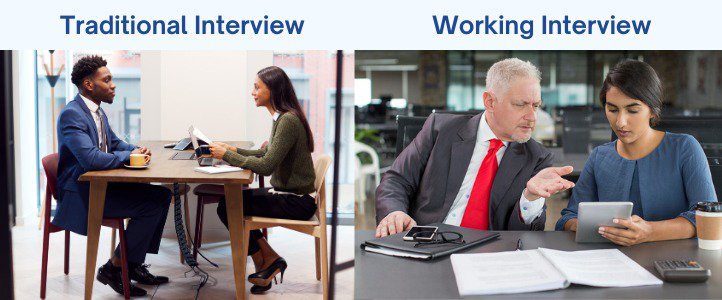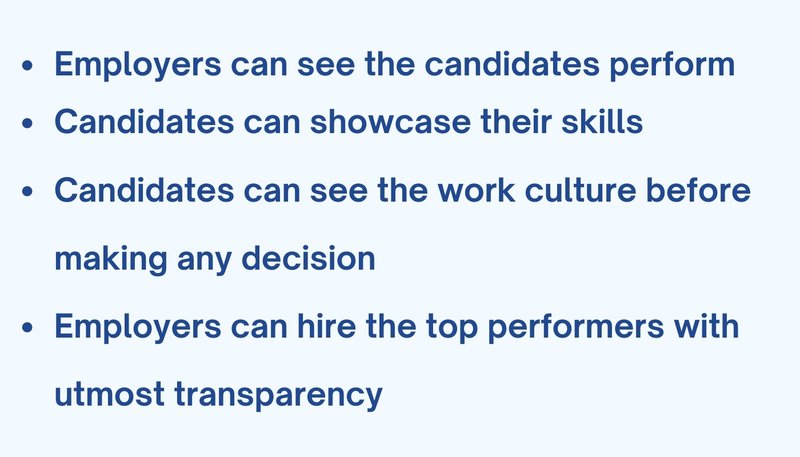
What’s a working interview? First, let’s talk about what comes to mind when we hear the word “interview.” Most of us still picture ourselves sitting opposite a few gentlemen. In today’s dynamic business world, though, employer’s hiring process is diverse and unconventional.
Employers use numerous interviewing methods to find the ideal candidate. Even the questions asked in interviews have taken a step away from the traditional. Another interviewing technique that has opted out of tradition is the concept of a working interview.
HR professionals have dubbed this method as highly pragmatic and incredibly beneficial to both the employer and the candidate. Here we have discussed everything about a working interview:
What Is a Working Interview?

In a working interview, the employer assigns the candidate a task or tasks to see how he/she performs. A working interview is based on an entirely different approach from traditional interviews that mostly involved questions regarding the job.
A candidate who possesses a wealth of theoretical knowledge might fail to put that knowledge to practice to become a valuable employee.
So, instead of bombarding the candidate with purely theoretical questions, a working interview tests their basic skills. As mentioned above, this interviewing method is commended for how effective it is for both parties.
Let’s dive right in and explore the benefits of a working interview.
What to Expect at a Working Interview?
During a working interview, you must probably be requested to show some of your skillsets. Not only that, you will spend the workday in a way you feel you’re part of the company.
It’s not only a skill evaluation but in general, since candidates with technical knowledge perform these interviews, the interviewers will ensure you have professional experience expected for the position. A working interview can have a practical problem and tasks to be solved. They will analyze the time and ways you solve and approach the problem.
In some cases, you can expect to be the entire day at the company and complete a task by the end of the day. Ask in advance the time you will be requested there to be prepared and rested.
On your side, you can observe the company’s culture and management style to evaluate if the job and the company are a good fit.
How Are Working Interviews Beneficial?

From the employer’s perspective
It allows them to see the potential employee perform. When it comes to technical jobs, answering theoretical questions is vastly different from being a dedicated employee. Much like a sports trial, a working interview lets the employers know what they’re getting.
From the candidate’s perspective
A working interview allows them to showcase their skills. Such an interviewing method strips away all the unnecessary questions and leaves what matters the most — YOUR SKILLS.
A working interview is a golden opportunity to show the employer how good an asset you can be to the company.
Practical exposure to the work culture
A working interview also allows candidates to feel the workplace environment and experience the job and challenges that come with it. After all, every employer boasts about their superior work culture in the job descriptions they send out.
A working interview allows you to understand the working environment to make an informed decision if you receive the job offer.
It’s fair, and only the best gets hired.
As direct and practical as they are, working interviews are also a lot fairer. After all, the employer gets to see the candidate perform, and the candidate gets to showcase his/ her skills. Whether he/ she receives the job offer or not, he/ she cannot complain.
On the other hand, it gives employers a better chance of hiring only the top performers.
How to Walk Out Triumphant From a Working Interview?
NO! There are no sure-shot tips or tricks to boss a working interview. But specific recommendations will surely increase your chances of receiving the offer letter.

Research: Do it well.
One of the most prominent mistakes candidates make before interviews is missing out on research. This mistake might prove to be costlier if you have been called up for a working interview.
Make sure that you go through the company’s website and do your research well. Try to get an idea about the values that they hold high. Try to understand the company’s vision and the “why” of their founder’s mission.
If you know their brand and their business well enough, you can work accordingly and make them see glimpses of their values in your work. A sure-shot way for you to beat the competition.
Dress up: It matters.
Working interviews are primarily about candidates showcasing their skills. That does not mean you can walk into the office in a wrinkled shirt and dirty shoes. In other words, dressing up in formal business attire and looking the part will help a working interview as it is in a traditional interview.
If the employer does not find you presentable in the professional sense of the word, it might just put your skills to waste and cost you an excellent job opportunity.
Be clear on the information.
You might have years of experience in the job profile. You might also be everybody’s favorite employee in your job. Whatever may be the case, you cannot be over-confident and complacent in a working interview.
Please read all the directions carefully and attentively listen to every verbal instruction they give. If you are confused regarding some aspect of the task, ask them and clear the confusion. Remember, it is not a race, and you should make fair use of every single minute given to you.
Taking the instructions for granted will only lead to silly mistakes that can turn an offer letter into a cold “keep trying” from the employer.
Let the employer know about your expectations.
Some employers pay candidates for the work they do during a working interview. Some make it clear that they will not be paying you. Being a candidate, you should also be very clear about your expectations.
Ask yourself whether you are comfortable with not being paid. If they have agreed to pay, what will their paying criteria be? It gives you clarity of expectations, and you exude a professional vibe that is always an advantage during an interview.
Maintain your tone of voice.
Although it is wise not to take up tasks that you have no idea about, avoid sounding too negative in a working interview. Your tone of voice should be enthusiastic, and the employer should get the idea that you are willing to learn the parts of the job with which you are not already familiar.
Take your time to answer any questions that are asked and stay calm and collected. Remember, the ability to work under pressure is listed in every job description as a requirement. The last thing you want is to give the employer the idea that you might crumble under pressure.
Don’t ask questions just for the sake of it.
Some candidates tend to ask silly questions just because they want to interact with the employer. Yes, it is always a good idea to be interactive during an interview, but asking questions just for the sake of it might hurt your cause. If there is one thing professional people hate, it is silly questions.
So, go through the written instructions, listen to the verbal instructions attentively, and only ask questions that remain unanswered.
Lastly, even though working interviews are primarily about what you do and not what you say, your attitude matters. It would be best if you exude a positive, go-getter vibe in the way you talk. If you manage to portray yourself as a confident professional, it can also go as far as to cover for the lack of experience or skills on your part.
Be Interactive. It’s Not Just About the Interview

The primary objective of any candidate going for a working interview is to secure an offer letter. But it is not just about whether or not you get that particular job. It is also about getting to know people within your industry and making a lasting impression professionally.
The couple of days you spend at a workplace during a working interview must not be just about sitting in a corner and completing the tasks given.
Teamwork and communication skills are incredibly vital for professionals in today’s day and age. Ensure that you introduce yourself to people and try to have meaningful conversations with them regarding the company or the industry.
Do not try to be too friendly or come off as someone trying to use people skills to cover up the absence of actual talent. Your priority should be the task at hand, but you shouldn’t limit the time you spend at the workplace during the working interview to just that.
After all, the employer is looking for a professional to strengthen their team. YES! That is the word, TEAM! Keep it in mind.
Remember: It Is Not Only a Skill Test
A working interview differs from a skill test.

In a skill test, they might ask you to complete a single task, whereas a working interview is pretty much like a day at the office. As mentioned already, you cannot entirely rely on the quality of the work you do. The key is to really live a day at the office and be there, not just physically.
It is impossible not to think about the offer letter, but you must try to drive yourself out of such a mindset. It will hamper your confidence, and you will find it hard to fit in at the workplace. On the other hand, having an unhealthy amount of confidence in your skills will make you look like an arrogant person.
Think back, and you will surely remember that good-performing but arrogant colleague nobody wanted to hang out with. You do not want to portray such an image during a working interview. Only a well-measured combination of people skills and work skills will increase your chances of getting your hands on that offer letter!
If you want to learn more about job interviews, check our topics below:
- Preliminary Interview: Meaning, Purpose, And Tips To Ace It
- What Is A Working Interview And How To Outperform In One?
- What are Formal And Informal Interviews? How to succeed?
- Remote Interview: 14 Tips For a Successful Interview
- Interview Outfits: What To Wear For a Successful Interview
- What Are Open Interviews? 10 Ways To Ace Them
- Types Of Interviews And Ways To Ace Them
- 10 Indispensable Tips For a Successful Job Interview

Christian has over ten years of experience in marketing agencies. Currently, he has been dedicating his time to a tech startup and also writing for major publications. He loves podcasts and reading to keep up with the latest trends in marketing.
